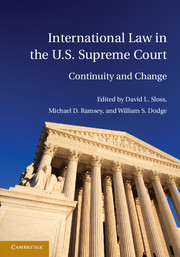Book contents
- Frontmatter
- Contents
- List of Contributors
- Table of Cases
- Acknowledgments
- Introduction
- PART I FROM THE FOUNDING TO THE CIVIL WAR
- PART II FROM THE CIVIL WAR TO THE TURN OF THE CENTURY
- PART III FROM THE TURN OF THE CENTURY TO WORLD WAR II
- PART IV FROM WORLD WAR II TO THE NEW MILLENNIUM
- PART V INTERNATIONAL LAW IN THE U.S. SUPREME COURT IN THE TWENTY-FIRST CENTURY
- V.A TREATIES AFTER 2000
- V.B CUSTOMARY INTERNATIONAL LAW AFTER 2000
- V.C INTERNATIONAL LAW AND CONSTITUTIONAL INTERPRETATION AFTER 2000
- V.D INTERNATIONAL LAW AND STATUTORY INTERPRETATION AFTER 2000
- V.E INTERNATIONAL LAW AND THE WAR ON TERROR
- Main Essay – The Supreme Court, the War on Terror, and the American Just War Constitutional Tradition
- Response Essay – Constitutional Resolve in a World Changed Utterly
- Response Essay – Judicial Imperialism and the War on Terror Cases
- VI CONCLUSION
- Index
- References
Response Essay – Constitutional Resolve in a World Changed Utterly
Published online by Cambridge University Press: 05 July 2011
- Frontmatter
- Contents
- List of Contributors
- Table of Cases
- Acknowledgments
- Introduction
- PART I FROM THE FOUNDING TO THE CIVIL WAR
- PART II FROM THE CIVIL WAR TO THE TURN OF THE CENTURY
- PART III FROM THE TURN OF THE CENTURY TO WORLD WAR II
- PART IV FROM WORLD WAR II TO THE NEW MILLENNIUM
- PART V INTERNATIONAL LAW IN THE U.S. SUPREME COURT IN THE TWENTY-FIRST CENTURY
- V.A TREATIES AFTER 2000
- V.B CUSTOMARY INTERNATIONAL LAW AFTER 2000
- V.C INTERNATIONAL LAW AND CONSTITUTIONAL INTERPRETATION AFTER 2000
- V.D INTERNATIONAL LAW AND STATUTORY INTERPRETATION AFTER 2000
- V.E INTERNATIONAL LAW AND THE WAR ON TERROR
- Main Essay – The Supreme Court, the War on Terror, and the American Just War Constitutional Tradition
- Response Essay – Constitutional Resolve in a World Changed Utterly
- Response Essay – Judicial Imperialism and the War on Terror Cases
- VI CONCLUSION
- Index
- References
Summary
As Professor David Golove notes, it may or may not be too soon to write about the Supreme Court's “war on terror” cases as history. Journalism may be history's “first rough draft,” but Golove shows why respected scholars should get in on the act early. Typical of his work, although still sadly rare in legal scholarship, his essay reflects substantial research, reminding us of the nation's original and longstanding commitment to the laws of war and to the role of separation of powers in ensuring their application. Likewise typical, Golove puts the research he sets forth to innovative and provocative use, arguing that while the Supreme Court's recent terrorism jurisprudence may depart from settled precedent, it does so more faithfully to serve the Founding commitments.
Professor Golove's approach reflects an irony worth noting at the outset, not least because it has characterized many accounts of the Court's terrorism jurisprudence. This irony begins with the now commonplace observation that in fundamental ways the 9/11 attacks represent a distinct break with past experience. Golove acknowledges that the attack really did confront the United States with a new and terrible phenomenon. The scale of the threat made it too big for a criminal law framework. As Professor Bruce Ackerman has emphasized, where previously terrorists could at worst kill by the dozen, now thanks to technology, they threaten destruction on a scale once reserved for war. Yet for all the rhetoric to the contrary, neither can it be considered war in any conventional sense.
- Type
- Chapter
- Information
- International Law in the U.S. Supreme Court , pp. 575 - 581Publisher: Cambridge University PressPrint publication year: 2011



